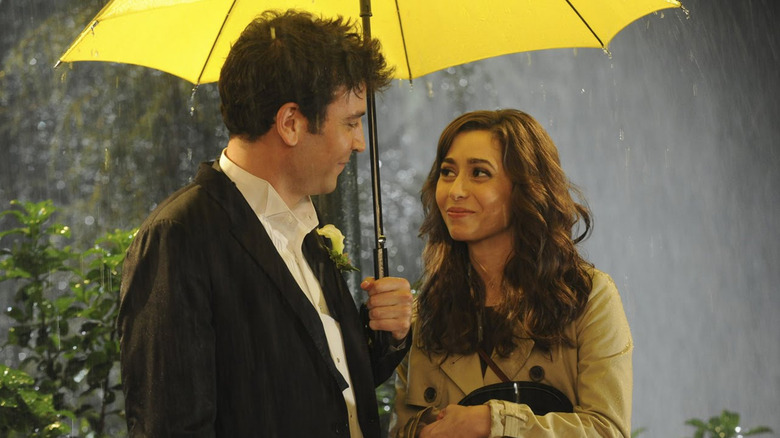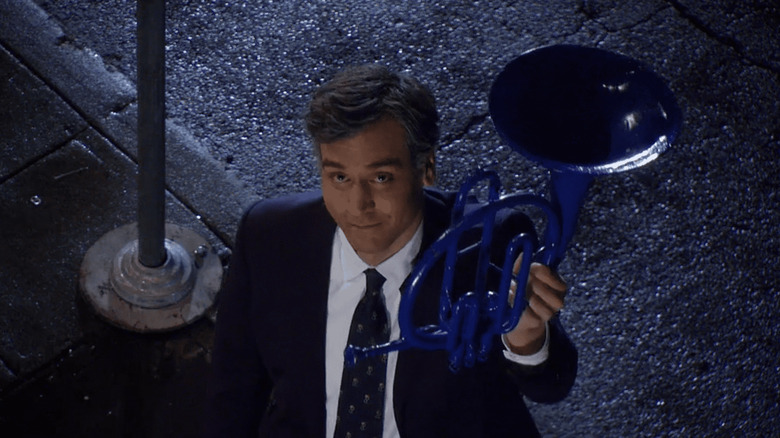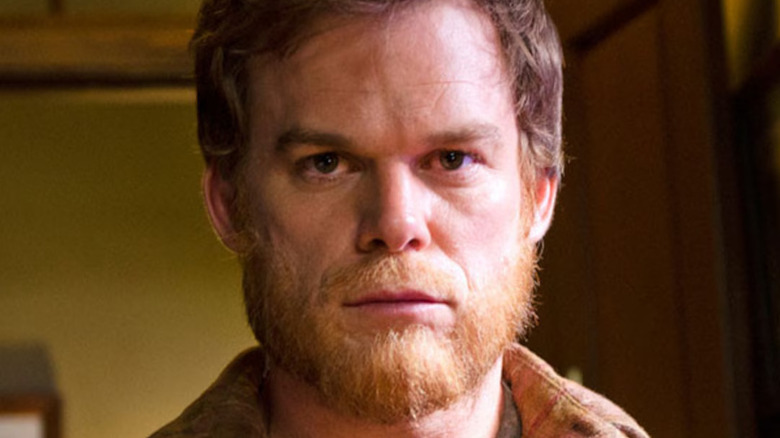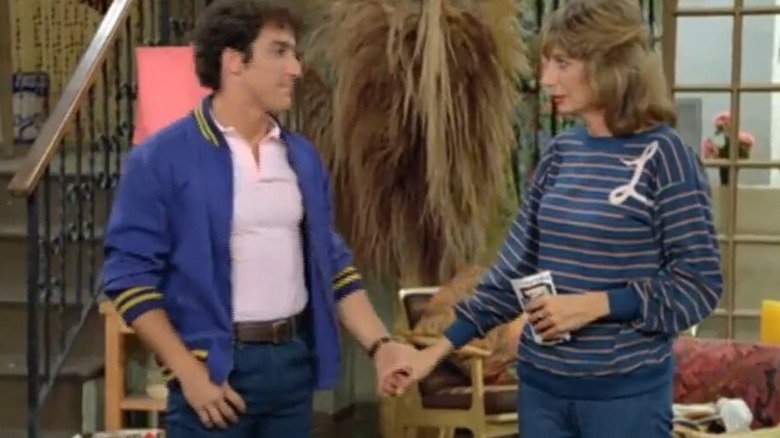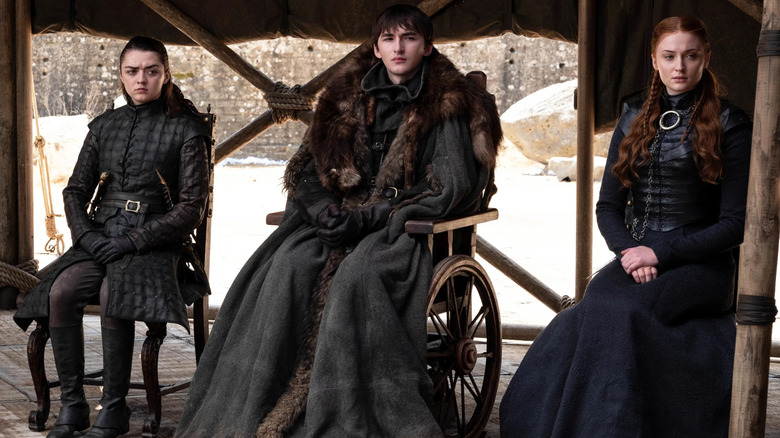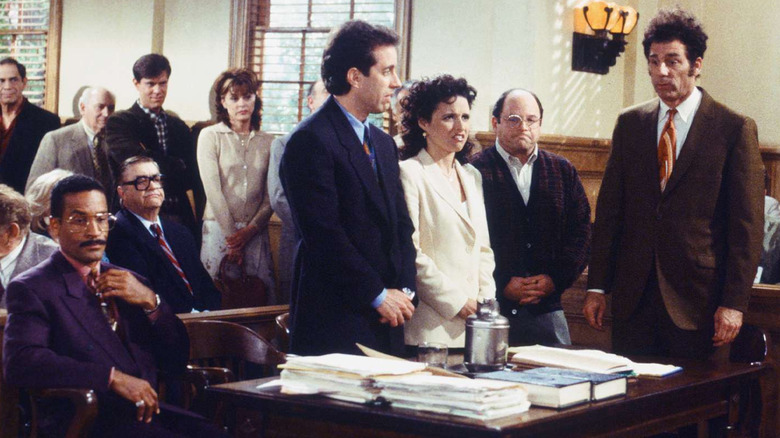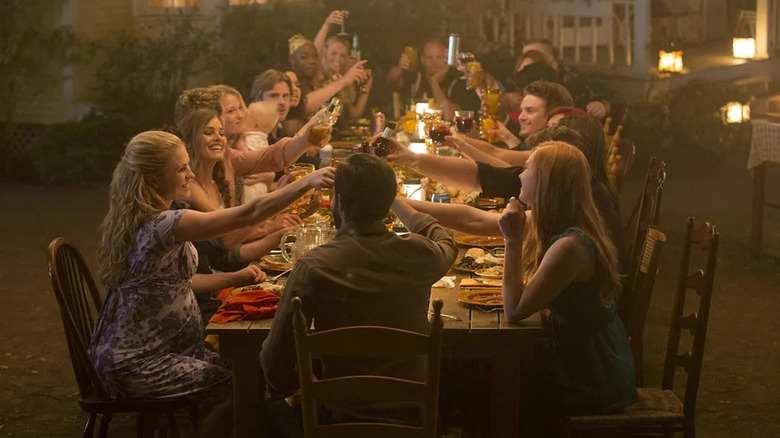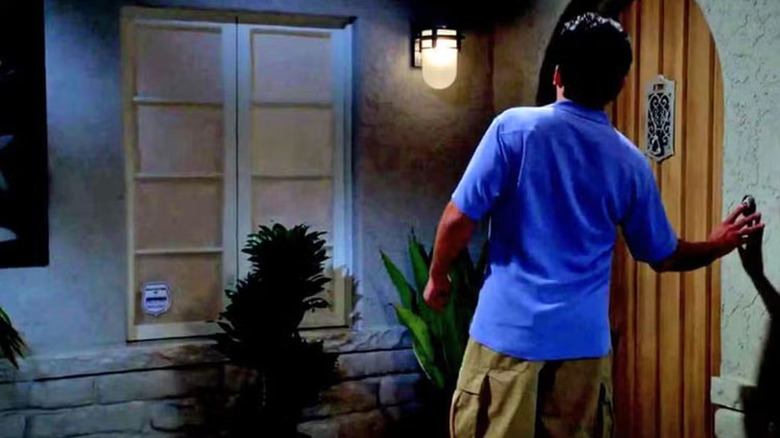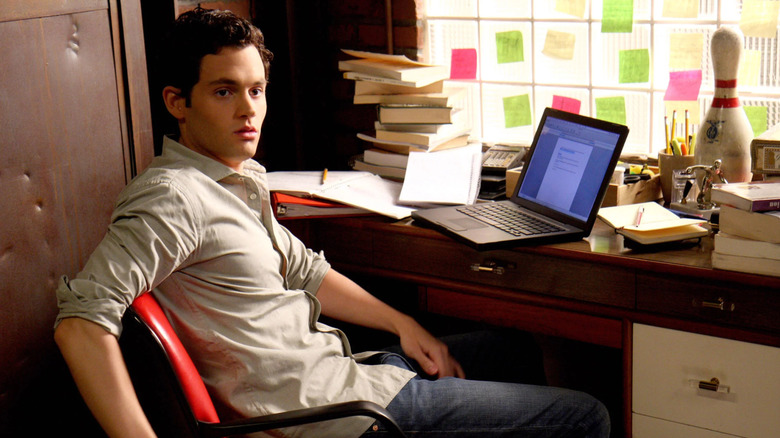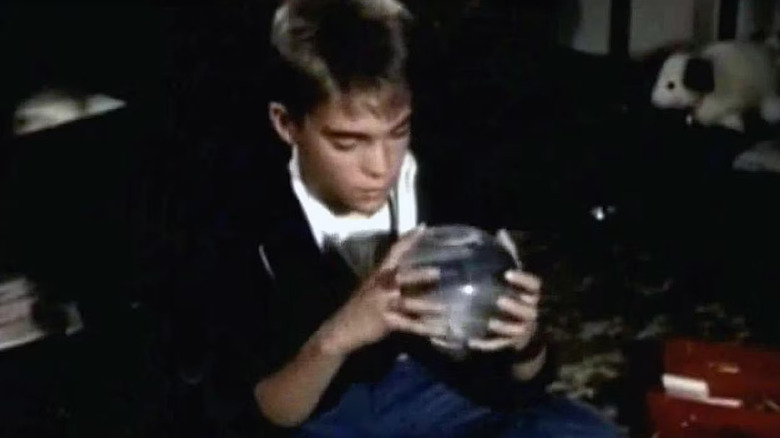The 10 Worst Series Finales Of All Time
Some shows know how to go out while they're on top, popular, and still have something worthwhile to say about the world and its characters. But then there are those unfortunate television series that don't know when or how to say goodbye. Sometimes they miss their chance to give a proper farewell to their characters in order to make a political point or bash an actor attached to the show. Other times they're so married to a concept or a series finale idea that the whole show suffers from forcing the concept into existence.
There are many things that can make a series' finale terrible, but only the very worst manage to scare up vibes that damage the entire show for all eternity. They may have started out as hot hits or sentimental favorites, but these ten shows ended in such cruddy ways that they ended up staining the program's reputation forever. These shows aren't ranked in any particular order, but they definitely provide an immortal hangman's row of follies and foolish choices.
How I Met Your Mother
A classic example of a show that had its audience completely sucked in for years only to biff it all with a spectacularly awful series finale, the ending of "How I Met Your Mother" was so unpopular that it was recut for the DVD collection and then re-released digitally with an alternate ending. But despite this attempt to fix things, audience anger still hasn't been quelled years later, and it remains one of the most unpopular series finales of all time.
The entire final season of the show centered around the wedding of Robin Scherbatsky (Cobie Smulders) to Barney Stinson (Neil Patrick Harris). The union instigated major growth for both characters and was extremely popular among the sitcom's fanbase — and the finale pulled them apart and had them divorce. Barney then went on a multi-lady bender, which resulted in him getting a stranger pregnant, turning into an insufferable girl dad, and, eventually, becoming an ex-player. Meanwhile, Robin settles back into an apartment filled with a pack of dogs, living the same career-driven life she was immersed in when the gang first met her. Marshall (Jason Segel) and Lily (Alyson Hannigan), meanwhile, remain boring and stable, continuing to have kids that Lily seems to be mildly resentful toward.
The biggest insult comes when Ted (Josh Radnor) explains that his wife, Tracy (Cristin Milioti) — whom the audience has barely known for a season but had come to love — died of cancer before the show began. His children promptly demand that Ted go do what he really wants to do — ask their Aunt Robin out again, which was the apparent purpose of his long, rambling story about how he met their mother. The icky implications here are myriad, and while some have tried to claim that it was a beautiful, intelligent choice that reflects the circular nature and tragic tendencies of being alive, this conclusion still haunts the sitcom in syndication years later.
Dexter
The word "LumberDexter" has sent chills through the hearts of procedural fans everywhere, and the show's producers have spent years trying to undo their mistake. But no matter how many sequel shows Showtime conjures up, it's hard to deny that the ending of "Dexter" is, at best, a downright bizarre insult to the audience that wanted to see some real fallout from the titular character's (Michael C. Hall) morally grey deeds.
The series finale finds Dexter tracking down and killing murderer Oliver Saxon (Darri Ingólfsson) with a stab to the jugular vein in revenge for his trying to kill Dexter's adopted sister, Debra (Jennifer Carpenter). Dexter may have avenged Debs, but he can't stop a post-surgery blood clot from taking her life. In grief, he steals her body and brings her out to the middle of the ocean to drop her there during a storm. He decides to disconnect from love interest Hannah (Yvonne Strahovski) and young Harrison, faking his death in a boating accident before surfacing in Oregon as a logger. This was such an odd narrative choice that the show's producers have done everything they can to erase the audience's memory of it, reviving the series twice to improve upon their initial misstep. Since fans of "Dexter" have always had mixed feelings, at best, about the finale, that's a blessing.
Laverne and Shirley
"Laverne & Shirley" was about two young brewery workers dealing with life on the job in 1950s and 1960s Milwaukee. Emerging feminist issues and class distinctions also provided important storylines. The girls had no cash and lived in a basement apartment, scraping to get by while looking for good times, true love, and a leg up in the world.
After a bicoastal move and a shift into the mid-60s, the show came to an end after eight seasons. But the series finale didn't feature Shirley thanks to a huge pregnancy discrimination lawsuit involving star Cindy Williams, series creator Garry Marshall, the show's other producers, and ABC. And it didn't feature much Laverne (Penny Marshall), either, who only appears in two scenes.
The final episode serves as a backdoor pilot for Carmine Ragusa (Eddie Mekka), Shirley's longtime boyfriend, who had become a lynchpin of the series as its eighth season struggled along. He moves from Los Angeles to New York to try his luck on Broadway, nails an audition to be part of the chorus of "Hair," and makes friends with his slick co-star, Rick (Ben Powers), with whom he ends up sharing a cold water flat. The idea of an all-guy version of "Laverne & Shirley" died with this episode — it wasn't picked up for the 1984 fall season. While Williams and Marshall later reunited to play their characters for a sketch that gave fans closure, the series itself will forever live in the shadow of the horror that is Season 8.
Game of Thrones
A finale so infamous that even the show's actors seemed to be blatantly frustrated by it, and one that retroactively crashed the series, though not the franchise, in the audience's eyes, the end of "Game of Thrones" is so notoriously impugned because it's incredibly rushed and jettisons loads of character development in order to deliver as many shocking deaths as possible. Audiences sneered and booed, and while it hasn't hurt the various prequel and sequel series that have spun out of it, the reputation of "Game of Thrones" itself suffered a mighty blow the moment the show aired.
The sprawling finale sees Jon Snow (Kit Harington) kill a megalomaniacal Daenerys Targaryen (Emilia Clarke), while Tyrion Lannister (Peter Dinklage) heads his own council under Sansa Stark (Sophie Turner), the new queen of the North. Bran (Isaac Hempstead Wright), elected the Ruler of the Six Kingdoms, ascends to the Iron Throne while his sister, Arya Stark (Maisie Williams), heads off in search of new adventures.
Though the Stark siblings are somewhat shattered, they do manage a reunion, but it's not enough to save the episode, even for fans who waited years to see them back together. While the narrative door definitely remains open — and might be revisited in sequel shows — the finale's bad taste makes it tough to enjoy the show again years later.
Seinfeld
The final episode of "Seinfeld" was an outing that was, for once, about something; namely, punishing the show's characters. But while they might deserve their fates, and, to be fair to the show, they won't be trapped forever, many fans didn't find it a fitting conclusion to the crew's adventures. It comes off as too sour and cynical, and considering how sour and cynical "Seinfeld" could be — in an achingly funny way — that says a lot.
The episode sees the entire motley cast of characters fly from New York to LA when they learn that Jerry (Jerry Seinfeld) and George's (Jason Alexander) sitcom has been picked up. Unfortunately, they manage to crash a private plane belonging to NBC into a small Massachusetts town just a few hundred miles away from home. Though they all survive, they end up in jail and are put on trial after failing to obey that town's Good Samaritan laws.
Having mocked a carjacking victim instead of helping him, they're now forced to cope with every sin from their past rising up to bite them as their trial rolls on. Ultimately, they're sentenced to a year in prison, which they greet with their typical indifference. It's a trial about nothing ending a show about nothing — but fans have always hoped that the show would someday yadda-yadda its way out of its ridiculous finale.
True Blood
"Bland" should never be the best way to describe the ending of a sexy vampire thriller that captivated the world, but "True Blood" ended up going out with a notoriously weak whimper. The spicy drama's finale played more like a Hallmark movie, as much of the runtime concentrated on couples getting together, getting married, and having babies.
Fans do get closure — Jessica (Deborah Ann Woll) and Hoyt (Jim Parrack) get married; Sookie (Anna Paquin) ends up not with Bill (Stephen Moyer) — who dramatically chooses to kill himself instead of living out his final days with Hepatitis V – but finds herself pregnant with a total stranger's (to the audience) child. All but lost in the episode's obsession with domestic bliss, there's at least Eric (Alexander Skarsgård) and Pam (Kristin Bauer) living their best vampire lives, wreaking bloody havoc on some baddies.
The finale's major sin is that everything is so homogeneous — there's no camp, no wildness, and certainly no lust and passion. Just a burst of nuclear family happiness and southern comfort that misses the show's point entirely. It might feel like the perfect happy ending in another franchise, but for "True Blood" it comes off as a Laura Ashley-styled suburban nightmare — the wrong kind of fright.
Two and a Half Men
Petty grudges should never impact the way a TV series ends, but the finale of "Two and a Half Men" will forever sit in the shadow of the feud between series EP Chuck Lorre and the show's former star, Charlie Sheen. Infamously, the conflict had already tainted the show's late-series run, with Charlie Harper (Sheen) being killed off and replaced by Ashton Kutcher's Walden Schmidt. The show dragged on for four more experimental seasons before the series aired its final episode, which exists mostly to make metatextual reference to the series itself and Sheen's real-life controversies. The series ends by finally getting one last one-up on Charlie Harper as he heads out the door.
The majority of "Of Course He's Dead" revolves around the revelation that Charlie didn't die after all — he has, in fact, been held prisoner in the basement of Rose's (Melanie Lynskey) home. But Charlie has escaped and is seeking revenge on Alan (Jon Cryer) and Walden for spending his money and, more importantly, failing to rescue him. In the end, the family believes that it's all been a mistake when another suspect wearing a Charlie-type outfit is arrested nearby. But the final scene sees Charlie finally returning to his Malibu beach house, ringing the doorbell ... and having a piano dropped on his head. Zoom out to Chuck Lorre sitting in a director's chair. "Winning!" he chirps, before a piano "crushes" him, too. All of this has aged incredibly poorly over the years and will go on to confuse generations of rerun watchers, as Sheen and Lorre have since buried the hatchet.
Gossip Girl
Dan Humphrey: Gossip Girl. It's a statement that still doesn't sit right with fans of the glamorous CW series, which ended with a revelation that makes absolutely no sense for Dan, the show's long-running storyline, and years of "Who is Gossip Girl?" teases. Fans continue to debate over whether or not the show made the right choice here, but history has not been favorable toward this ending at all.
In "New York, I Love You, XOXO," Chuck Bass (Ed Westwick) and Blair Waldorf (Leighton Meester) finally get married, and, during the ceremony, everyone finds out that Dan (Penn Badgley) is Gossip Girl. Everyone forgives him far too readily for destroying their lives, interfering in their relatives' lives, and committing other sundry crimes. Instead of receiving his comeuppance, five years later, Dan is married to Serena van der Woodsen (Blake Lively). Meanwhile, Chuck and Blair have a kid, Nate Archibald (Chace Crawford) runs a successful paper, and Ivy Dickens (Kaylee DeFer) has written an autobiography that is being made into a major movie. Blair and Jenny (Taylor Momsen) run a successful fashion line together, and Kristen Bell cameos in a winking way. All of this would be well and good — if we didn't have the Dan revelation sitting on the show's back, ruining everything.
Killing Eve
The title of the series might have acted as heavy foreshadowing, but procedural fans were furious that the show went with the most obvious answers and easiest out. After years of teasing the attraction between serial killer Villanelle (Jodie Comer) and the cop chasing hero, Eve (Sandra Oh), the series ends with cop and killer uniting for a romantic day. Then — as if to pay for her many murderous sins from the preceding four seasons – Villanelle is killed by an assassin's bullet and presumed dead when she falls into a river. The show ends with Eve alone in the middle of said river, diving down to search for her, surfacing while shouting out in anguish. Her screams may well represent the audience's own.
There's nothing that ages worse than the "bury your gays" trope, and rewarding the audience with the apparent death of its main character after four seasons of hoping and yearning isn't something that's going to get them to watch reruns or hope for a reunion movie. It's a dirty trick, no matter what way you slice it, and fans definitely deserved better. Audiences rightfully called it cruel when it came out, and that's why it still comes up every time TV fans talk about awful series finales.
St. Elsewhere
TV fans have been subjected to many horrible series finales over the years, but perhaps none were more terrible than being told that the world they cared about and the characters they invested in for years had never existed within the show's reality. In the case of one series, they only exist in the mind of Tommy Westphall (Chad Allen), the autistic son of Dr. Westphall.
When "St. Elsewhere" ended with its heavily anticipated finale, it revealed at the last moment that St. Eligius Hospital never existed. What's more, none of the doctors who worked there were real people, either, and the two characters who did exist — Dr. Westphall (Ed Flanders) and Dr. Auschlander (Norman Lloyd) — weren't even doctors. Either the main cast only lived in Tommy's imagination, or they're somehow trapped within his snow globe.
To be fair to the show, "St. Elsewhere" never really played with a full narrative deck when it was airing, as it would frequently bend the bounds of reality to its whims. But erasing almost every character from existence was just a step too far for its fans. What makes this even more fascinating is that it means most of American television only exists within Tommy's mind, thanks to the fact that so many characters from other series can be linked directly back to "St. Elsewhere." Call it fascinating, call it inventive, call it thought-provoking — but no matter how much you loved the show, it was pretty hard to swallow back in the day.
